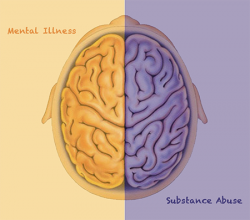Dual Diagnosis Treatment Options
It’s not uncommon for people suffering from psychological disorders to also battle addiction problems. Interestingly enough, years of drug abuse more oftentimes than not triggers underlying psychological disorders as well as causes new disorders to develop. People affected by addiction and psychological disorders most benefit from dual diagnosis treatment approaches that effectively address and treat both problems.
Dual diagnosis treatment options mainly use medication-assisted therapies couples with ongoing counseling or psychotherapy. By employing an integrated approach, drug treatment programs can offer recovering addicts the best chance of beating addiction and better managing psychological problems.
Dual Diagnosis Effects
When considered separately, psychological disorders and addiction problems both originate from the combined.
effects of biological, psychological and social or cultural influences, according to the Mental Health Services Research Journal. Someone living with both types of conditions has, at the very least, twice as much to contend with in terms of the severity of symptoms experienced and the sets of challenges each condition brings.

Treatment for co-occurring disorders requires an approach that addresses all parts of an individual’s condition.
From a mental health standpoint, a dual diagnosis condition can greatly speed up the onset of addiction, meaning people diagnosed with psychological disorders at a young age may develop addiction problems at an earlier age. A psychological disorder also makes it that much more difficult for recovering addicts to remain in treatment with many dropping out altogether.
In general the more severe the psychological disorder the more likely a person is to relapse after receiving drug treatment help. For these reasons, dual diagnosis treatment
options must employ an integrated treatment approach that incorporates:
- A comprehensive assessment and diagnosis process
- Psychotherapy, both individual and group
- Crisis intervention assistance
- Medication therapies
- Education on dual diagnosis conditions
- 12-Step support groups
As dual diagnosis conditions come with two separate sets of symptoms, over time, the symptoms of addiction and mental illness become intricately entwined and harder to treat unless a person receives appropriate treatment help.
Medication-Assisted Treatment Options
As different types of addictions and different types of psychological disorders may or may not warrant medication therapies, the use of medication-assisted options as a dual diagnosis treatment can vary considerably. According to the National Center for Biotechnology Information, the more severe the psychological condition the more likely medication therapies will be of benefit.
As symptoms of psychological disorder can range anywhere from panic attacks and suicidal ideations to mild depression and restlessness, the more distressing the symptoms the less likely a person will be able to follow through in addiction treatment.
Dual Disorders Recovery Counseling
Counseling work plays a vital role in treating both addiction problems and psychological disorders. It’s also an essential component of dual diagnosis addiction treatment. According to the National Institute on Drug Abuse, the Dual Disorders Recovery Counseling model integrates psychiatric interventions with addiction counseling approaches rather than offering one or the other.
Through Dual Disorders RecoveryCounseling, recovering addicts learn to manage and stabilize symptoms associated with psychological disorder while learning new ways of coping with everyday life without the need for drugs. As dysfunctional behavior patterns are a central aspect of addiction and psychological disorder, this counseling approach enables participants to develop needed positive lifestyle changes in the place of dysfunctional coping behaviors.



